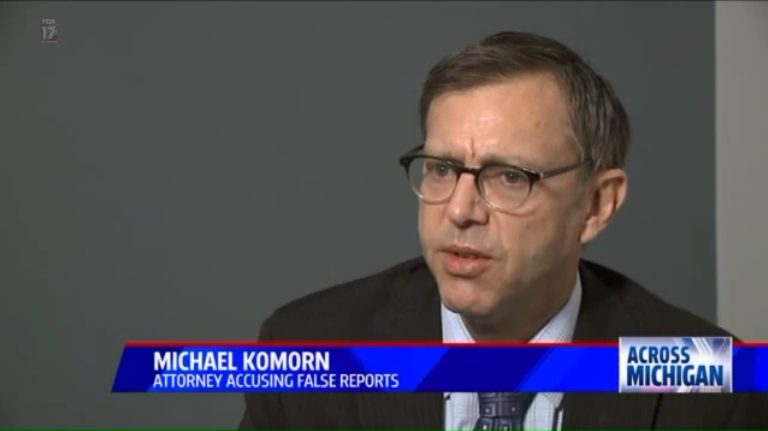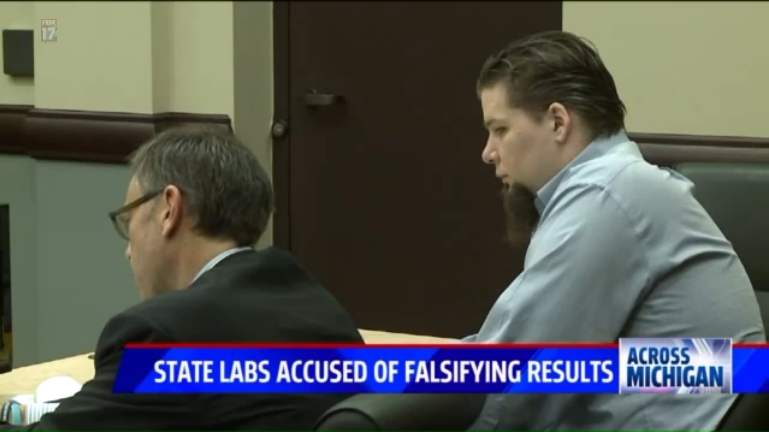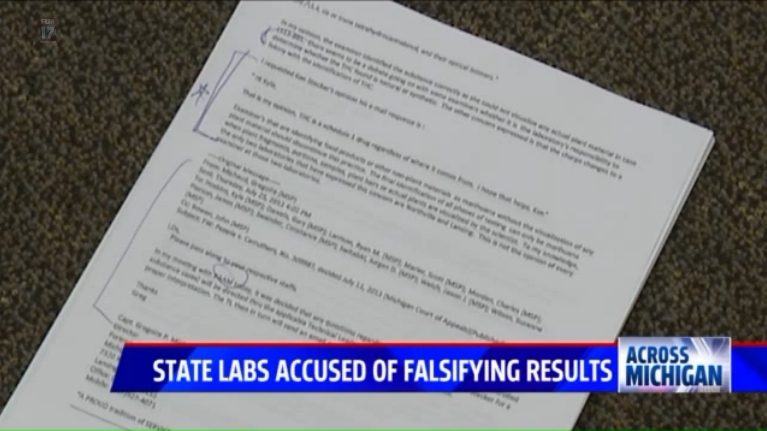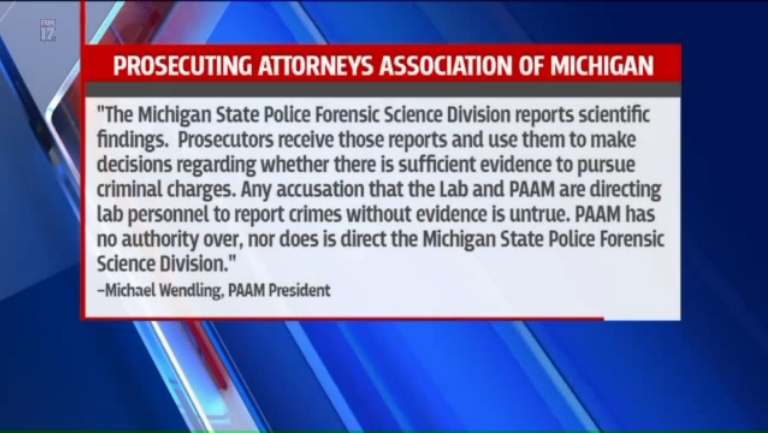
Nov 4, 2015 | Blog, Criminal Defense Attorney Michael Komorn, Medical Marijuana Attorney Michael Komorn, News
OTTAWA COUNTY, Mich. – The evidentiary hearing originally set for Nov. 5 has been dropped in the case involving a medical marijuana patient charged with a disputed felony for synthetic THC, the psychoactive ingredient in marijuana.
The Ottawa County Assistant Prosecutor filed motions to quash, or suppress, the defense’s subpoenas, and adjourned the Nov. 5 hearing until a later date. Essentially this move buys the prosecution more time before explaining this issue of possible politicking in Michigan State Police Forensic Science crime labs’ marijuana reporting.
Since February, FOX 17 has covered this case involving the defendant, Max Lorincz, a Spring Lake father charged with a felony for having medical marijuana. His attorneys with Komorn Law PLLC argue Lorincz’s “smear” amount of butane hash oil is covered under the Michigan Medical Marijuana Act as “usable marijuana,” or specifically the “mixture of preparation” of the marijuana plant.

Since last week FOX 17 is leading statewide coverage of a major development in the case: the defense’s claim that state police crime labs are misreporting marijuana test results. This results in ambiguous crime lab reports leading to felonies charged, despite no credible proof beyond a reasonable doubt of what the substance actually is.
The prosecution filed a motion to quash the defense subpoenas in rebuttal to the defense’s motion to quash Lorincz’s bindover and well as their motion to show cause to produce evidence and testify against incriminating emails that spell out a debate among law enforcement, scientists, and prosecutors associated with the Attorney General’s office in reporting marijuana forensically.
Earlier, the defense’s motion to show cause subpoenaed 13 people to appear in court this Thursday: 11 MSP crime lab employees, one West Michigan Enforcement Team member, and the one prosecutor with the AG’s office. The defense had ordered the named people to show lab reports, communications, and marijuana related forfeitures, all of which would produce important testimony.
However, Assistant Prosecutor Karen Miedema in her motion to quash subpoenas argued whether these people should even testify, and wrote that this would take too much time: citing Lorincz’s preliminary exam last spring, which took three hours to hear two witnesses.
Although Miedema filed this motion Oct. 30, the defense told FOX 17 they just received a phone call Tuesday adjourning Thursday’s evidentiary hearing. The defense plans to file further motions and call for a hearing likely in December.
FOX 17 reached out to the Ottawa County Prosecutor’s office and has not heard back.
Tune into FOX 17 News at 10 p.m. Thursday for an in-depth story into the developing allegations in this case.
Dana Chicklas
fox17online.com /2015/11/03/hearing-in-alleged-false-crime-lab-marijuana-reporting-dropped-thisweek/

Nov 1, 2015 | Blog, Medical Marijuana Attorney Michael Komorn, Michigan Medical Marijuana Act, News, Recent Victories
OTTAWA COUNTY, Mich. – First uncovered by FOX 17 an alleged scandal in how state crime labs are testing and reporting marijuana, namely marijuana by-products with no visible plant matter, as felonies.
We first brought you the case of an Ottawa County father, Max Lorincz, who was slapped with a felony after he refused to plead guilty to a misdemeanor marijuana possession charge, as he is a medical marijuana card-carrying patient. Now he faces the felony charge of synthetic Tetrahydrocannibinol (THC) possession.

Lorincz lost custody of his 6-year-old son in part due to this felony.
After reporting on the case over nine months, FOX 17 exclusively reported a shocking email chain that spans months between Michigan State Police Forensic Science Division employees and the Attorney General’s office.
Obtained through the Freedom of Information Act, these emails show debates on how the state’s crime labs changed how they report marijuana. The defense, attorney Michael Komorn and Komorn Law, PLLC, is charging state agencies with directing the lab employees to falsely present results on marijuana products, including cases where plant material is not seen.
The result: felony charges Komorn argues are lies.

Komorn showed evidence in emails that MSP Forensic Science Division is being directed by the Attorney General’s office and the Prosecuting Attorneys Association of Michigan (PAAM) to change the way marijuana is reported to create felonies. PAAM is a non-profit, which is governed by a board of directors including the Attorney General.
“What is unique about this case is that they [the prosecution] are relying on the lab to report these substances so that they can escalate these crimes from misdemeanors to felonies,” said Komorn.
Documents obtained via FOIA, showcase emails about meetings (for instance, July 2013) and direct communication between MSP Forensic Science Division directors, scientists, PAAM, as well as officials with the AG’s office.
An excerpt from an email dated Dec. 13, 2013 suggests an AG official influenced the state crime labs on whether it is the lab’s responsibility to determine if THC tested is natural or synthetic; again, this is the difference between a misdemeanor and a felony.
A technical leader of controlled substances with MSP crime labs wrote an email to colleagues and quoted Ken Stecker, an official with the AG’s office:

“That is my opinion, THC is a schedule 1 drug regardless of where it comes from. I hope that helps. Ken”
Then, the technical leader of controlled substances at a state lab continues to direct other state lab personnel and write:
“Examiner’s that are identifying food products or other non-plant materials as marihuana without the visualization of any plant material should discontinue this practice. The final identification of all phases of testing can only be marihuana when plant fragments, portions, samples, plant hairs or actual plants are visualized by the scientist. To my knowledge, the only other two laboratories that have expressed this concern are Northville and Lansing.”
Komorn believes this policy change is not science-based.
“This is like a political decision, and somewhere in there they say well Ken Stecker is going to be the consultant on this going forward, and his position is that THC is a schedule 1,” said Komorn.
“That’s not the law. That’s an incorrect, illegal misinterpretation of the law that he then decrees as the policy for the state lab.”
This AG official’s “opinion” was written into lab procedure. Several emails show other MSP lab supervisors and scientists vehemently oppose it.
For example, a MSP Lansing controlled substances supervisor wrote his disagreements with this policy to colleagues, including an excerpt from an email dated Feb. 14, 2014:
“Prosecutor’s rely on our reports to determine what to charge a person with. A report that states delta-1-THC without any other statement would lead a Prosecutor to the synthetic portion of the law since this is the only place where THC is specifically listed. This could lead to the wrong charge of possession of synthetic THC and the ultimate wrongful conviction of an individual. For the laboratory to contribute to this possible miscarriage of justice would be a huge black eye for the Division and the Department.”
This supervisor wrote further concerns in an email to many colleagues nearly one year later, dated Jan. 28, 2015, writing in part:
“Upon reading this correspondence I immediately thought about the Guiding Principles training we receive yearly. Under Professionalism it states that “Conclusions are based on the evidence and reference material relevant to the evidence, not on extraneous information, political pressure, or other outside influences.” Whether or not an individual has a medical marijuana card is immaterial to how we report out our results.
When we made the previous changes I made it very apparent that I did not agree with it. One of my concerns was that by reporting out THC instead of marihuana it would lead to Prosecutors charging people with synthetic THC. This appears to be what the agency wants.”
Another MSP Northville lab scientist wrote the following to colleagues, stating concerns with new reporting policy:
“In order to place the actual compound THC in schedule 1, the criteria of ‘synthetic equivalent’ should be met. Since we really can’t do this, there are many of us who feel that these new evidentiary materials containing THC without any botanical morphology characteristics (candy, butter, etc..) should be identified as resinous extracts of Marihuana.
If you are to call it ‘THC,’ at a minimum, a statement should be provided in the additional information stating that the ‘origin, whether naturally occurring or synthetic could not be determined.’ Also, by going out on that limb and calling it THC, you now jump from a misdemeanor to a felony charge.
We’re bringing this up because there seemed to be some concern about uniformity in making these calls. Further, it is highly doubtful that any of these Med. Mar. products we are seeing have THC that was synthesized. This would be completely impractical. We are more likely seeing naturally occurring THC extracted from the plant!”
“The most damning evidence is that their own forensic scientists, when they’re objecting to the way the lab is going to change their reporting policies, calls them out that they can’t do it based on forensic science, and yet they do it anyways,” said Komorn.
Thursday afternoon, the Prosecuting Attorneys Association of Michigan’s President Michael Wendling responded to FOX 17’s questions with the following statements:
“The Michigan State Police Forensic Science Division sets its own testing and reporting protocols. Neither PAAM nor county prosecutors make those protocols.”
“The MSP Forensic Science Division makes its own decisions relative to the lab protocol. Any decision to report that the source of THC is undetermined does not create a misdemeanor or felony offense. Lab reports document the findings of scientific testing. Those findings, in conjunction with other relevant evidence are considered by prosecutors may be used in when the decision whether to charge a crime and which crime to charge is made.”
“Prosecutors do not receive requests to charge criminal cases from the MSP Forensic Science Division. The MSP Forensic Division reports scientific findings. Prosecutors receive those reports and use them to make decisions regarding whether there is sufficient evidence to pursue criminal charges. Any accusation that the Lab and PAAM are directing lab personnel to report crimes without evidence is untrue. PAAM has no authority over, nor does it direct the MSP Forensic Science Division.”

Yet again in this case, several lab scientists and supervisors expressed they are against this new marijuana reporting protocol.
As FOX 17 reported, the defense filed several motions in Ottawa County Circuit Court this week. The motions ask for Max Lorincz’s charges to be dismissed, as well as asking the accused organizations’ employees to show cause, or credible evidence to show science backs their protocol, in order to not be held in contempt of court.
The evidentiary hearing is set for Nov. 5.
FOX 17 also reached out to the Attorney General’s office for comment, but has yet to hear back. Michigan State Police public affairs personnel released comment to FOX17 Wednesday.
Watch The Report

Nov 1, 2015 | Blog, Criminal Defense Attorney Michael Komorn, Komorn Law Blog, News
DEWITT, Mich. – A former director of Michigan State Police Forensic Science addressed the serious allegations FOX 17 uncovered, which accuse the Attorney General’s office and state prosecutors of influencing state police crime labs to falsely report marijuana; essentially turning misdemeanors into felonies.
Former MSP Forensic Science Director John Collins told FOX 17 that he resigned from this role in 2012 due, in part, to these crime lab reporting issues: politics working to trump science.
“In my experience, it was just a non-stop political game that really got frustrating, and it wore down the morale of our staff, and it quite honestly, it wore me down.”
Collins served as director 2010 through 2012, when he said he surprised the agency by resigning; even after the 2012 success of helping earn MSP Forensic Science international accreditation with the American Society of Crime Laboratory Directors/Laboratory Accreditation Board.
“It was really a big deal for me to let people understand that our laboratories were not in the prosecution business, they’re not in the conviction business, they’re in the science business,” said Collins.
“And if we don’t position ourselves as being in the science business, then we really start to go down a path that’s going to lead us to a lot of trouble. And that was very tough, because that was a major cultural, a different kind of a cultural message than had really been communicated before.”
Collins said forensic science is his passion. He is now president of The Forensic Foundations Group, a consultant, and publishes articles quarterly in Crime Lab Report: Media and public policy analysis for the forensic science community. Last March, Collins also published an article in Forensic Science Policy & Management: An International Journal, and depicted how a utopian forensic crime lab would operate, which he said is quite different than state labs.
“There is a lot of politics that is involved in these cases,” said Collins.
“So even if the state police was to really kind of buck the trend, and say, ‘look, these laboratories are scientific organizations, they’re not law firms, okay, and we’re not going to let them become law firms,’ even if they kind of buck that trend, you can bet that there’s going to be some angry prosecutors that are going to call the Governor’s office and complain. It’s like kicking over a bee’s nest.”
FOX 17 reviewed documents with Collins, including the months of emails between MSP Forensic Science directors, scientists, and Attorney General office officials, as well as a recent crime lab report; documents the defense for Max Lorincz, Komorn Law PLLC, obtained through the Freedom of Information Act.
Lorincz, an Ottawa County father, is the defendant whose case FOX 17 has covered since February. Lorincz, a card-carrying patient, is charged with a felony for having a “smear” amount medical marijuana, in the form of Butane Hash Oil.
“An accreditation assessor would have a problem would probably look at this and have a problem with why would you even say anything like this?” Collins said, looking at the crime report’s phrase, “origin unknown.”
After review of Lorincz’s crime lab report, Collins said he is not surprised to see the ambiguous results.
“Even though I don’t know the nature of what occurred within the state police, any time that scientists, or administrators of scientific operations, if they would intentionally try to create ambiguity to create a political advantage is beyond unacceptable,” said Collins.
Collins explained it is appropriate for prosecutors to explain state statutes to crime labs, or what elements constitute a crime. However, he said for any prosecutors or other officials to tamper with science is illegal.
“One thing that we do not do, or should not do, is try to widen the gray area so that we create more ambiguity so that more possibilities are on the table,” said Collins. “That’s not science, that politics.
FOX 17 has received statements from Michigan State Police Public Affairs as well as the Prosecuting Attorneys Association of Michigan regarding these accusations.
Yet their responses appear to be blanket statements. Both agencies defer to the other: MSP public affairs officials wrote that it is up to the prosecutors to charge crimes, and then PAAM president wrote it is up to the crime labs to report science.
FOX 17 has reached out to the Attorney General’s office for comment, and has yet to hear back.
As for the defendant in this case, Max Lorincz told FOX 17 Friday that he wants the prosecutor held accountable. Lorincz also questioned the amount of money that has been spent in court over this case, and asked for justification of his felony charge.
It has been more than 13 months since his 6-year-old son was taken from his home, in part due to this felony charge. Lorincz and his family have started a GoFundMe page to help raise money to continue fighting his case.
Watch The Fox 17 Report
www.forensic-news.com/a-non-stop-political-game-former-msp-forensic-science-director-on-false-marijuana-reporting/

Oct 31, 2015 | Blog, Criminal Defense Attorney Michael Komorn, Komorn Law Blog, Medical Marijuana Attorney Michael Komorn, News
Posted on MLive 10/30/15
OTTAWA COUNTY, MI – An attorney claims prosecutors pressured state police crime labs to change the way THC, the active ingredient in marijuana, is reported in an effort to circumvent Michigan’s medical marijuana law.
Michael Komorn alleges scientists were told to report an unknown origin for THC contained in oil, wax or perhaps a brownie if no visible plant material was present. The THC would then be declared a synthetic substance rather than marijuana – turning a misdemeanor pot charge to a two-year felony.
“The crime lab is systematically biased towards falsely reporting Schedule 1 synthetic THC, a felony, instead of plant-based marijuana, a misdemeanor, ” Komorn, a Southfield attorney known for handling medical marijuana cases, told The Grand Rapids Press and MLive.
In the case of Max Lorincz, a 35-year-old Spring Lake man with a medical marijuana card, the change could turn him into a felon, Komorn said.
Lorincz’s troubles started in September 2014 after calling 911 for medical assistance for his wife. A police officer responded and spotted a small amount – “a smudge,” Komorn said – of hash oil.
Ottawa County prosecutors charged him in January with marijuana possession, a misdemeanor. He refused to plead guilty because he was a valid medical marijuana user. The charge was dropped in February, only to be replaced by the felony synthetic THC charge.
Komorn used the Freedom of Information Act to obtain numerous emails from state police crime lab workers, some raising concern about the way they had to report THC cases. Others testified in court about the new policy of denying evidence of THC coming from a marijuana plant if no material is found.
He contends that the Prosecuting Attorneys Association of Michigan and state Attorney General Bill Schuette, an opponent of medical marijuana, influenced state police policy.
“It is scandalous, scandalous. How can you trust the state lab when they are influenced by politicians?” he said.
State police said in a statement: “The ultimate decision on what to charge an individual with rests with the prosecutor. The role of the laboratory is to determine whether marihuana or THC are present. Michigan state police laboratory policy was changed to include the statement “origin unknown” when it is not possible to determine if THC originates from a plant (marihuana) or synthetic means. This change makes it clear that the source of the THC should not be assumed from the lab results.”
Ottawa County Prosecutor Ronald Frantz could not be reached for comment.
A hearing in Lorincz’s case is set for Nov. 9 in Ottawa County Circuit Court.
In an email Komorn obtained from authorities, a state police crime lab supervisor, Kyle Hoskins, said examiners need to see plant material because they would have no idea how it was produced unless they watched its production. He noted the debate and asked the opinion of Ken Stecker of the Prosecuting Attorney Association of Michigan, who reportedly responded: “That is my opinion, THC is a schedule 1 drug regardless of where it comes from. I hope that helps. Ken.”
Marijuana is a Schedule 2 drug under state law.
Related: ‘It’s been a nightmare,’ man says of contested synthetic marijuana charge
Lt. James Pierson, director of the Grand Rapids laboratory, said that police are finding a “significant amount of THC wax and oil,” which he said are not covered by the medical marijuana law.
If police seize wax or oil from a medical marijuana patient, and the lab test identifies the substance as marijuana, rather than delta-1-THC, there is no probable cause to arrest, Pierson said in an email referenced by Komorn in court filings.
He said he learned that if a “speck” of plant material is in the oil, the test will come back as marijuana.
“Is there any way to get this changed? Our prosecutors are willing to argue that one speck of marijuana does not turn the larger quantity of oil/wax into marijuana,” Pierson wrote.
Bradley Choate, supervisor of the Controlled Substances Unit in Lansing, disagreed with the changes. He said analysts are left with two choices when finding THC: identify it as marijuana, which is a misdemeanor for possession, or a synthetic equivalent of THC, which is a felony if possessed.
“There is not a third choice,” Choate wrote. “The question then becomes is the THC from a natural source, i.e., marihuana, or a synthetic source. The presence of other cannabinoids indicates that the substance is from a natural source. I don’t know of any other way to determine that THC was synthesized unless a lab was found and the pre cursor substances to make THC were present.”
He said prosecutors rely on their reports in filing charges. A report that says delta-1-THC with no explanation would lead a prosecutor to think the substance was synthetic.
“This could lead to the wrong charge of possession of synthetic THC and the ultimate wrongful conviction of an individual. For the laboratory to contribute to this possible miscarriage of justice would be a huge black eye for the Division and the Department.”
As forensic scientists, Choate said they had to apply science to the law.
“I have a problem with the procedure manual stating that a conclusion of marihuana cannot be stated in the report. … The conclusion is incorrect because the resins are Marihuana. Apparently analysts in our system (are) hung up on the fact that to identify marihuana they need to see plant material.”
Choate said that “Guiding Principles” training says “that ‘Conclusions are based on the evidence and the reference material relevant to the evidence, not on extraneous information, political pressure, or other outside influences.”
“When we made the previous changes I made it very apparent that I did not agree with it. One of my concerns was that by reporting out THC instead of marijuana it would lead Prosecutors charging people with synthetic THC. This appears to be what the agency wants. The question I would pose to all of our analysts is how they would answer questions on the stand.
“In the scenario described how would they answer the question that absent the plant material speck, in their opinion is the rest of the wax material marihuana or not and in their opinion is the THC identified synthetic or natural? Again the legal definition of marihuana includes the resinous extract which contains cannabinoids and we can identify those cannabinoids.”
see original article and more stories here
John Agar covers crime for MLive/Grand Rapids Press E-mail John Agar: jagar@mlive.com and follow him on Twitter at twitter.com/ReporterJAgar

Oct 31, 2015 | Blog, Criminal Defense Attorney Michael Komorn, News
Fri, 10/30/2015 – 4:11pm
A Michigan medical-marijuana patient claims in court papers that state police crime labs are bending to pressure from prosecutors in analyzing marijuana samples, leading to harsher punishments.
Maxwell Lorincz, 35, was originally charged with a possessions misdemeanor for a small amount of marijuana oil after a Sept. 2014 arrest during an emergency call to his home, according to court papers. He contested the charge, due to his status as a legal medical-marijuana patient. It was dropped in January. But a month later he was charged again – and due to a laboratory finding that the oil could be synthetic THC, it was increased to a felony charge with potential prison time under Michigan law.
Lorincz’s attorney Michael Komorn alleges the lab engaged in perjury, evidence tampering, and even “rampant illegality” in considering the sample synthetic, due to pressure from prosecutors, they contend in the latest court papers filed Oct. 24.
“The Crime Lab was transformed into a Crime Factory which had the direct effect of stripping, in this case Mr. Lorincz, and other patients or caregivers statewide the State authorization to the entitlement to immunity, from arrest, prosecution, or any penalty associated with the medical use of (marijuana),” contends Komorn in the latest motion.
The latest filings, obtained by Forensic Magazine, include emails between lab staff, produced by a Freedom of Information Act request. The emails show that the scientists Michigan State Police Crime Lab found the hash oil was “Schedule I THC” from “origin unknown” – mostly because the analysts contend it showed no visible plant material. Prosecutors then brought the felony charge, based on the finding the THC could be synthetic.
However, the defense attorneys argue that there were multiple other naturally-occurring cannabinoids in the sample which are not psychoactive – and would be pointless to synthesize.
In one of the internal emails, a forensic scientist wrote to his colleagues at the lab that the origin “could not be determined,” and outlined some of the policy repercussions.
“Also, by going out on that limb and calling it THC, you now jump from a misdemeanor to a felony charge,” wrote the analyst. “We’re bringing this up because there seemed to be some concern about uniformity in making these calls.
“Further, it is highly doubtful that any of these Med. Mari. (sp) products we are seeing have THC that was synthesized,” the analyst added. “This would be completely impractical. We are most likely seeing naturally occurring THC extracted from the plant!”
The Michigan Attorney General’s Office and the Ottawa County Prosecutor’s Office did not return calls from Forensic Magazine.
However, the Prosecuting Attorney’s Association of Michigan’s president told local TV station Fox 17 that the allegations against the forensic scientists were groundless.
“Any accusation that the Lab and PAAM are directing lab personnel to report crimes without evidence is untrue,” Michael Wendling, the Association’s President reportedly said in a prepared statement.
www.forensicmag.com/articles/2015/10/medical-marijuana-patient-alleges-prosecutors-swayed-crime-lab-drug-tests








